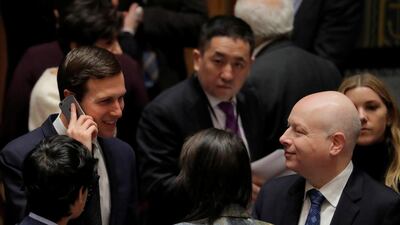White House adviser Jared Kushner and the US special representative to the peace process Jason Greenblatt will travel to the region at the end of this month, where they will meet with Gulf officials to discuss the economic portion of the long-awaited plan.
A senior White House official told reporters in a briefing on Thursday that the trip will take place in the last week of February, and so far will include the United Arab Emirates, Oman, Bahrain, Saudi Arabia, and Qatar – other stops may be added to the itinerary.
The trip will be strictly focused on the economic portion of the US peace plan and it will not include Israel, the Palestinian territories, Jordan or Egypt.
At the briefing, attended by The National, the US senior official said “Jared is going to share elements of the economic plan to the region. The economic plan only works if the region supports it …This is a very important part of the overall equation.”
As The National has previously reported the US peace plan is near done but it is unlikely to be released before [the Israeli] elections scheduled to take place on April 9. The US official said “We would not be taking this trip if we were not serious about a launch in the coming months.”
The trip to the Gulf was initially scheduled for January but was delayed because of the US government shutdown last month. “They’re not going to support the economic plan without making sure they also support the political plan, and we recognize that. So the support, I’m sure in some manner, will be conditioned on whether they are comfortable with the political plan.”
The official stressed that the US is not solely attempting to find an economic peace, and that the political portion of the plan will be detailed and critical.
“This is not a so-called economic peace. We really are taking very seriously both aspects of this, the political and the economic … We understand that if the political aspect of it is not solid, the economic aspect is meaningless. But at the same time the political aspect will not succeed without a proper economic plan.”
The goal would be to bring in support for both the political and the economic aspects. “[Regional countries] are not going to support the economic plan without making sure they also support the political plan and we recognize that … so the support, I’m sure, will be conditioned on if they are comfortable with the political plan,” he said.
“If they agree to financially support our plan. That would be a success” he said.
As far as the goals of the economic plan are concerned, the US official described it as laying “the foundation for long term growth for the Palestinian economy. This involves a comprehensive package of public and private sector investments in all critical sectors of the Palestinian economy.”
There hasn’t been direct communication between the US negotiating team and the Palestinian Authority (PA) leadership since Washington moved its embassy to Jerusalem in December 2017.
Instead, Mr Greenblatt and PA officials have played out their disagreements on Twitter.
Addressing a PA spokesperson, Mr Greenblatt tweeted this week: “Well, Mr Nabil, we agree on something - there is no peace without an agreement. We are working hard on that. You’re doing nothing. You can’t claim to want peace and also try to sabotage the potential for an agreement.”
“We are challenging PA officials on twitter when they spread misinformation or make outrageous comments. They have gotten away with this for so long” the US official said.
The Trump administration still hopes that Palestinian president Mahmoud Abbas would come to the table following the release of the plan. “We hope Abbas reads the plan, judges it on its merits, and comes to the table for negotiations after we release the plan,” the official said.

